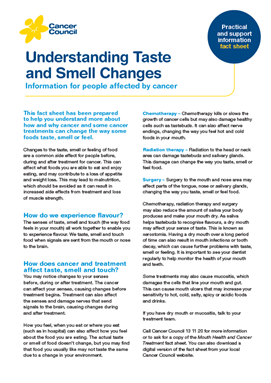- Home
- Cancer Information
- Managing side effects
- Taste and smell changes
Taste and smell changes
This information helps you understand more about how and why cancer and some cancer treatments can change the way some foods taste, smell or feel, and how to manage these changes.
Learn more about:
- Overview
- How do we experience flavour?
- How does cancer and treatment affect taste, smell and touch?
- What changes could I experience?
- How long do changes last?
- How to manage taste, smell and touch changes
Overview
Changes to the taste, smell or feeling of food are a common side effect for people before, during and after treatment for cancer. This can affect what foods you are able to eat and enjoy eating, and may contribute to a loss of appetite and weight loss. This may lead to malnutrition, which should be avoided as it can result in increased side effects from treatment and loss of muscle strength.
Podcast: Appetite Loss and Nausea
Listen to more episodes from our podcast for people affected by cancer
More resources
Emma McKie, Clinical Dietitian, Peter MacCallum Cancer Centre, VIC; Cecilia Barling, Consumer; Dawn Bedwell 13 11 20 Consultant, Cancer Council Queensland, QLD; Gillian Blanchard, Oncology Nurse Practitioner, Calvary Mater Newcastle, NSW; Dr Karen Taylor, Radiation Oncologist, GenesisCare Radiation Oncology, VIC.
View the Cancer Council NSW editorial policy.
View all publications or call 13 11 20 for free printed copies.
Need to talk?
Support services
Coping with cancer?
Speak to a health professional or to someone who has been there, or find a support group or forum
Cancer Council Online Community
A community forum – a safe place to share stories, get tips and connect with people who understand
Cancer information
Learn more about chemotherapy
Chemotherapy is the use of drugs to kill or slow the growth of cancer cells
What is cancer?
How cancer starts and spreads


